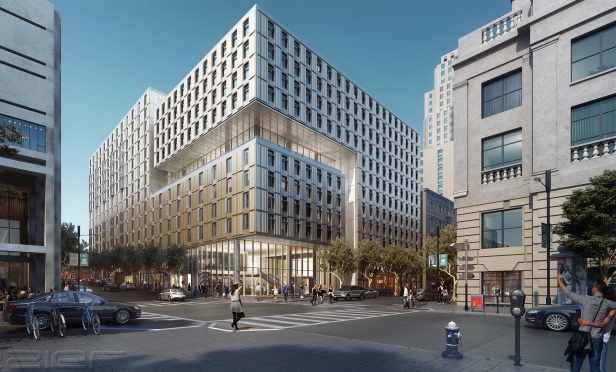 The academic village will commingle professional and graduate students in law, medicine and business.
The academic village will commingle professional and graduate students in law, medicine and business.
SAN FRANCISCO—The University of California Hastings College of the Law recently announced the selection of Greystar as its master developer for the next two phases (phases 2a and 2b) that includes plans for the creation of an academic village. The $450 million project will provide more than 900 units to the UC Hastings campus for students, faculty and staff, along with a renovation of the historic McAllister building. This project will also deliver an academic and mixed-use development supporting the campus and its vision for a multi-institutional graduate campus.
“Great law schools contribute positively to the environment and communities surrounding them,” says David Faigman, chancellor and dean at UC Hastings Law. “We are excited to be moving forward with Greystar to further develop this vibrant academic village in the heart of San Francisco, a hub of innovation commingling professional and graduate students in law, medicine and business.”
Greystar's development partner is Strada with Perkins+Will leading the design effort and Clark Construction as the general contractor.
Phase 2a, new construction of approximately 405,000 square feet in a 14-story building at 198 McAllister, will provide around 630 new units of campus housing and some 80,000 square feet of academic facilities and commercial uses. It is projected for completion in time for occupancy for the fall 2022 semester. Phase 2b will renovate a historic building, currently UCH's only on-campus housing option at 100 McAllister, with mixed-use amenities and nearly 300 modernized units by 2024.
“We want to create an academic village where students and faculty from multiple campuses, UCSF most significantly, can be housed and we blend these populations together,” said David Seward, chief financial officer, UC Hastings. “This project will create a new academic hub using campus housing development as both a means to help alleviate San Francisco's housing crisis, support small business development in the Tenderloin and elevate UC Hastings' prominence in the broader community. This is our biggest project ever.”
Phase 1 of the academic village at 333 Golden Gate Ave., is scheduled for completion by spring 2020. The academic building, designed by SOM and built by Clark Construction, will house 57,000 square feet of teaching space and UC Hastings' clinical programs combining innovative classroom and experiential learning opportunities with the college's unique location and relationships in San Francisco.
“Greystar is thrilled to be working with UC Hastings on their new academic village, a project which will be run by Mike McCone, senior development director at Greystar,” said Ali Warner, senior managing director at Greystar, Northern California and Pacific Northwest. “We look forward to a long and productive relationship and continuing to develop quality housing in San Francisco.”
Once the 333 Golden Gate Ave. project is complete, phase 2a will start with the demolition of the obsolete academic building at 198 McAllister. 198 McAllister will feature courtrooms, classrooms, office and retail space for use by the law school and other tenants. The student amenities will include study lounges, community kitchens and social lounges. The centerpiece of the mixed-use component will be an auditorium to welcome national speakers and faculty from around the country.
“San Francisco's 30 colleges provide housing for only 60% of its 120,000 students. Greystar is honored and very excited to be part of UC Hastings' A-team to reduce the student and faulty housing deficit in the heart of the city,” McCone tells GlobeSt.com.
Global investment in student housing totaled $17.1 billion in 2018, the third year in a row that volumes exceeded $16 billion, according to a report by Savills. While down 2% on 2017, total volumes are still up 425% since 2008 (all global real estate volumes rose by 130% during the same period). Provisional first quarter 2019 data showed a further $2.4 billion invested in the sector globally, with notable transactions from Brookfield, Greystar, PSP Investments and Allianz, says the report.
© Touchpoint Markets, All Rights Reserved. Request academic re-use from www.copyright.com. All other uses, submit a request to [email protected]. For more inforrmation visit Asset & Logo Licensing.







